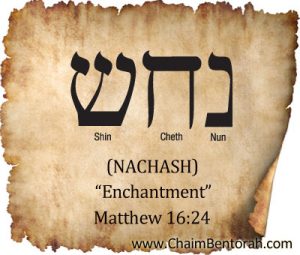HEBREW WORD STUDY – ENCHANTMENT – נחש Nun Cheth Shin
Matthew 16:24: “Then said Jesus unto his disciples, If any man will come after me, let him deny himself, and take up his cross, and follow me.”
 Practically every modern translation I read will render this as “let him deny himself.” The only exceptions are Young’s Literal Translation which says, “Let him disown himself,” and God’s Word Translation which says, “Let him say no to the things he wants.” For me, Young’s Literal is too harsh and God’s Word Translation is too soft and I am uncomfortable with the other rendering of “to deny oneself.” I guess I just cannot be pleased, but somehow it seems contradictory that God would create something and then tell you to deny it. Of course, we just assume He is referring to the old sinful nature that wants to do things contrary to the will of God. I can go along with that and can be comfortable using the word deny in that context, but I wonder if that is really what Jesus is saying.
Practically every modern translation I read will render this as “let him deny himself.” The only exceptions are Young’s Literal Translation which says, “Let him disown himself,” and God’s Word Translation which says, “Let him say no to the things he wants.” For me, Young’s Literal is too harsh and God’s Word Translation is too soft and I am uncomfortable with the other rendering of “to deny oneself.” I guess I just cannot be pleased, but somehow it seems contradictory that God would create something and then tell you to deny it. Of course, we just assume He is referring to the old sinful nature that wants to do things contrary to the will of God. I can go along with that and can be comfortable using the word deny in that context, but I wonder if that is really what Jesus is saying.
The word used in the Greek for deny is aparnesastho which has the idea of denying, rejecting or looking back to something that you once rejected. The word Jesus spoke in the Aramaic was kaphar which has the idea of denying but more in the sense of refusing or saying no to something. This is more in line with God’s Word Translation which renders this as “let him say no to the things he wants.” Yet, the closer I draw to God’s heart, the more I find that the things I want are the things that God wants. So why would God want me to refuse such things that I want if they are what He wants? In fact, to spend four hours a day basking in the Word of God is my greatest delight, am I supposed to reject this as I am not supposed to enjoy anything for to enjoy something means I am not denying myself?
I think the key to this lies in the word himself. The Greek uses the word heauton which is simply a reflexive pronoun – himself. The word that Jesus spoke in the Aramaic was napsha which is similar to the Hebrew word nasham which means breath, soul, or life. It is what God breathed into man to make him a nephesh or living soul in Genesis 2:7. So are we to deny the very breath of God? The Aramaic word napsha is much broader than the Hebrew word. This word could also mean just life itself, but why not use the more common Aramaic word for life which is chaye, which is similar to the Hebrew word for life which is chaim.
I believe Jesus used the alternative word for life (napsha) to create an interesting play on words, which was very common for a rabbi to do in those days. As I said the word napsha has a broad range of usages. One other use for this word is for a reptile. To the ancient mind, any slithering creature that had a tongue that darted out very quickly was a napsha such as a frog, toad, lizard and a snake. These animals were viewed as deceptive creatures that snuck up on its prey seemingly innocent and even friendly. Every watch a frog just calmly sitting on a lily pad, seemingly oblivious to the world, totally harmless and then all of a sudden its little tongue shoots out and snatches a fly in midair? Ever watch a snake just slithering along the ground? Its tongue is darting in and out of its mouth. You get the uneasy feeling that it is up to something and you become almost enchanted watching it when, without warning, it strikes out at its prey.
This is the idea behind napsha which we render as himself or ourselves. Napsha is that part of our life that is fascinated with things that are not of God. It is like a reptile that is seemingly innocent, wins your confidence that it is harmless and once it is in your grasp, it will strike out to devour you. Isn’t that what the enemy did in the Garden of Eden? In fact, one use of the word for serpent (nachash) in the Hebrew is an enchanter. The ancients believed that a snake enchanted its prey or put it under some sort of hypnotic spell where it is then able to seize and devour its prey without any resistance.
Perhaps Jesus is encouraging us to deny or reject that part of us, that part of our napsha (life) that can easily be enchanted with the things of this world, seemingly innocent things like a glimpse of pornography. I mean no one knows, no one is hurt, a quick trip to a naughty website and no harm done (other than picking up a virus on your computer). Yet, that bit of this world, that little bit of life (napsha) is slowing enchanting you like a nachash (serpent) and once it has you in its power it will devour you.
Pornography, drugs, alcohol, money, power, fame, etc., may seem innocent at first, but once you take of it, it starts to nachash (enchant) you and soon it draws you away from God for once it entwines itself around you it becomes your naspha (your life) and that becomes your god and the God who loves you takes back seat. Jesus is saying that you must deny or reject that napsha, that which controls your life, nail it to a cross and let it die so that you may follow Him. The words Jesus uses for follow in the Aramaic is ata batar which is roughly rendered as passing through and encompassing.
In other words, what Jesus is commanding us to do is to reject those subtle little deceptive reptilian life tactics that draw us away from God and to completely embrace or entwine ourselves in the life of Jesus Christ so that we will be ruled by Him and not by the lust of the flesh. He wants us to let Him control the things of our naspha (life) rather than the naspha (life) controlling us. Jesus said that no man can serve two masters (Matthew 6:24). We are either going to serve the lust of this life which has nachash or enchanted us or we are going to serve in the life of Jesus Christ who wants to ata batar (encompass or entwine) us with His love.
Click on the picture below to learn more about becoming a part of our online family with live Bible studies, classes and so much more! We hope to see you on Saturday morning!








Thank you for adding insight to scripture , I have been led the last couple of years to become increasingly aware of the “little foxes ” of life this was very much in tune . However , the next part of this verse let him take up his cross seems so easy to grasp but many trip on the fact that iwe are still warned or told that this is an on going process not a one time experience .Some would ask if I’ve left it behind me what is this cross ? I am involved in some street ministry and do so not know all of the answers to questions that people ask . Do you have a deeper meaning for the last part of this verse ?
I don’t know if it is true but a friend who is a Jewish believer told me it meant to deny identifying yourself as that old dead person you were prior to salvation. Denying that identity is another way of crucifying the flesh.
Just a thought
Blessing upon you
Thank you for sharing with us what you have discovered today by diving into the very word itself. It is amazing how a single word can open up like a book by itself. Most likely, we only read the words as they are without thinking more about it.
Today you opened up such a “book” (word: nachash) to us and took us into a revelation by the very “word” that gave the verse of the day a whole new meaning. I can relate very much to this understanding, an eye-opener and a pictorial understanding. I am a man of old age and have seen a lot of life on both good and evil and then this Word becomes alive.
Thank you!